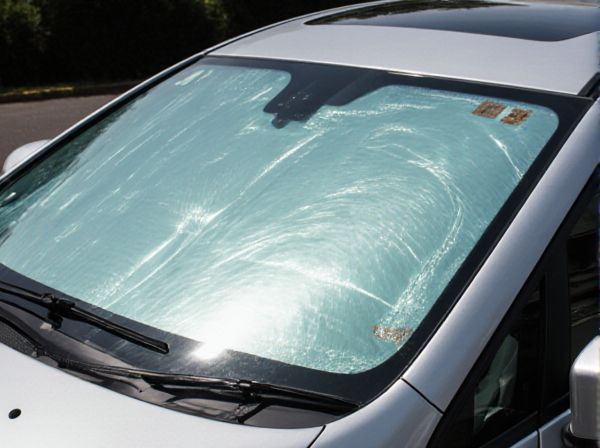
Photo illustration: Solar Reflective vs Standard Windshield
Solar reflective windshields reduce heat buildup by blocking infrared rays, keeping your vehicle cooler and protecting the interior from UV damage. Standard windshields allow more solar heat to enter, increasing cabin temperature and causing faster wear on upholstery. Choosing a solar reflective windshield enhances driving comfort and extends the life of your car's interior.
Table of Comparison
| Feature | Solar Reflective Windshield | Standard Windshield |
|---|---|---|
| Heat Reduction | Up to 50% solar heat block | Minimal heat reduction |
| Glare Reduction | Significant glare minimization | Standard glare control |
| UV Protection | Blocks 99% UV rays | Basic UV filtering |
| Fuel Efficiency | Improves AC efficiency, reduces fuel use | No impact |
| Cost | Higher initial investment | Lower upfront cost |
| Lifespan | Durable with UV-resistant coating | Standard durability |
Introduction to Windshields: Solar Reflective vs Standard
Solar reflective windshields incorporate a special coating that reflects infrared and ultraviolet rays, significantly reducing interior heat buildup and protecting passengers from harmful UV radiation. Standard windshields primarily offer basic protection from wind, debris, and UV rays but lack advanced heat rejection properties, making interiors warmer during sunny conditions. Choosing solar reflective glass enhances energy efficiency and comfort, especially in regions with intense sunlight exposure.
How Solar Reflective Windshields Work
Solar reflective windshields utilize a special coating containing microscopic metallic or ceramic particles that reflect a significant portion of infrared (IR) radiation from the sun, reducing heat transfer into the vehicle. This technology minimizes cabin temperature by filtering out IR rays while maintaining visible light transparency, enhancing comfort and reducing reliance on air conditioning. Compared to standard windshields, which primarily block ultraviolet (UV) rays but allow more heat through, solar reflective glass significantly improves thermal management and energy efficiency.
Standard Windshields: Features and Limitations
Standard windshields are typically made of laminated glass designed to provide structural integrity and basic UV protection without specialized coatings. They allow a higher amount of solar heat and ultraviolet rays to pass through, which can increase cabin temperature and contribute to interior fading over time. Lack of advanced solar reflective properties results in less effective heat management compared to solar reflective windshields, impacting comfort and energy efficiency in vehicles.
Key Differences Between Solar Reflective and Standard Windshields
Solar reflective windshields feature a special coating that blocks a significant portion of infrared and ultraviolet rays, reducing heat buildup and protecting the vehicle's interior. Standard windshields, made from regular laminated glass, primarily provide basic visibility and protection without advanced heat rejection properties. The key difference lies in solar reflective glass's ability to enhance comfort and energy efficiency by minimizing solar heat gain compared to standard windshield glass.
Heat Reduction and Interior Comfort
Solar reflective windshields use specialized coatings that block infrared radiation, reducing heat buildup inside the vehicle by up to 30% compared to standard windshields. This significant heat reduction enhances interior comfort by keeping cabin temperatures lower, minimizing reliance on air conditioning and improving energy efficiency. Standard windshields lack these coatings, allowing more solar heat to penetrate, which leads to higher interior temperatures and increased cooling demands.
Impact on Fuel Efficiency and Air Conditioning Use
Solar reflective windshields significantly reduce heat absorption by blocking up to 60% of infrared rays compared to standard windshields, leading to lower cabin temperatures. This reduction in heat load decreases the reliance on air conditioning systems, thereby improving fuel efficiency by up to 5-10%. In contrast, standard windshields allow more solar heat to enter the vehicle, increasing air conditioning demand and fuel consumption during hot weather conditions.
UV Protection and Passenger Safety
Solar reflective windshields incorporate advanced UV-blocking coatings that filter out up to 99% of harmful ultraviolet rays, significantly reducing skin cancer risks and interior fading compared to standard windshields. Standard windshields typically block only a minimal percentage of UV radiation, leaving passengers more vulnerable to prolonged sun exposure and potential eye damage. Enhanced UV protection in solar reflective windshields also helps maintain cooler cabin temperatures, improving passenger comfort and reducing heat-related health risks during long drives.
Cost Comparison: Installation and Maintenance
Solar reflective windshields typically have a higher initial installation cost compared to standard windshields due to their specialized coatings and advanced materials designed to reduce heat and UV penetration. Maintenance expenses for solar reflective windshields are generally comparable to standard windshields, though repairs may be more costly if the reflective layer is damaged since it requires specialized servicing. Over time, the energy savings and reduced interior wear from solar reflective windshields can offset the higher upfront installation cost, providing better overall value.
Longevity and Durability Factors
Solar reflective windshields enhance longevity by reducing heat buildup inside the vehicle, minimizing thermal stress that can cause cracks or premature wear compared to standard windshields. The reflective coating also protects the glass from UV damage, preserving its structural integrity over time. Standard windshields, lacking these protective features, are more susceptible to deterioration from prolonged sun exposure and temperature fluctuations.
Choosing the Right Windshield for Your Vehicle
Solar reflective windshields significantly reduce heat buildup by blocking infrared rays, enhancing cabin comfort and decreasing air conditioning use. Standard windshields offer basic visibility protection but lack the advanced heat reduction and UV filtration benefits of solar reflective glass. Selecting a solar reflective windshield improves energy efficiency, provides better protection against UV radiation, and maintains a cooler interior, making it the ideal choice for warmer climates and prolonged sun exposure.
 caratoz.com
caratoz.com